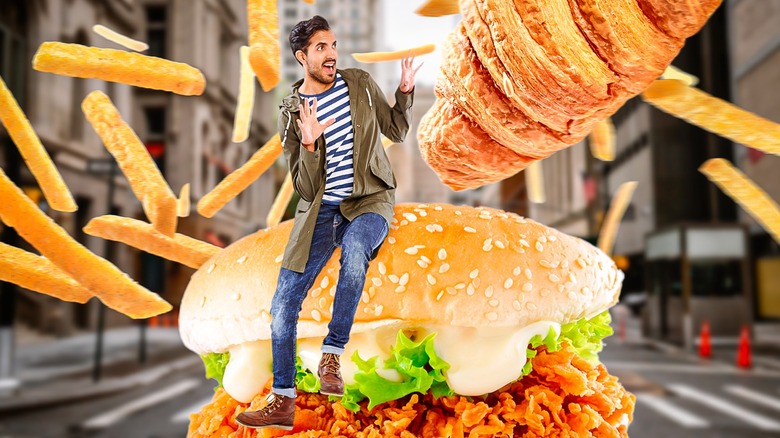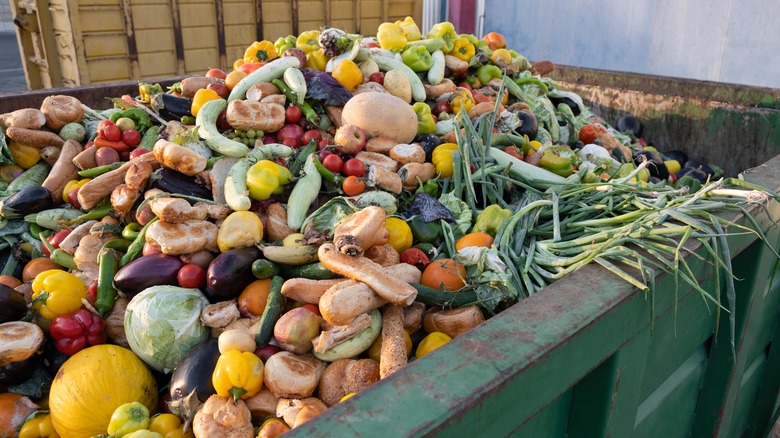We Need To Stop Supersizing Random Foods
Making foods bigger than they need to be is not a new concept. The 2004 Morgan Spurlock documentary "Super Size Me" notoriously took a deep dive into what can happen to the human body if it consumes McDonald's on a daily basis for 30 days. Perhaps not surprisingly, Spurlock gained almost 25 pounds and put his health in danger while on the monthlong McDiet. Of course, this was an experiment that demonstrated what happens when people go to extreme measures.
The other day, I was scrolling through TikTok and stumbled upon a video of a woman eating a croissant the size of a Bichon Frisé. Don't get me wrong ... I looove buttery, flaky croissants as much as the next person, but why on earth is this even a thing? Unless you share that ginormous French pastry with someone else (or a few others), you're bound to have a few stomach issues within the next hour or two. Why not just channel your inner Holly Golightly and enjoy a simple breakfast at Tiffany's instead?
The enormous croissant is only one example of supersized foods I've seen on the interwebs. From lattes as big as a mixing bowl to donuts that can basically double as inner tubes, the amplification of indulgences is not only wildly unnecessary — it's also just downright obnoxious. Yes, I completely understand that's the point of them: to make people turn their heads. But to me, it's a gimmick that's a waste of money, time, and energy for foodie influencers as well as everyday consumers.
Massive foods are likely terrible for your health
I get it. It's a marketing gimmick. Supersized foods have become common in fast-food restaurants, sporting arenas, and even cafés where the giant croissant was found. Craving a burrito that resembles a football? Sure, why not? While these cumbersome portions are often marketed as a quirky value for the customer, they can have negative consequences for both the individual and society as a whole.
@mariana_instyle Who would you share the biggest croissant from @Philippe Conticini with? #giantcroissant #paris
♬ Cupid – Twin Ver. (FIFTY FIFTY) – Sped Up Version – regex & bexter & Vraox
First and foremost, supersized foods can contribute to several health problems. There's no question that these huge portions are high in calories, fat, and sugar. In fact, nutritionists like Lisa Drayer think supersized portions often lead to obesity which can then become more complicated with heart disease and Type 2 diabetes. Yes, our eyes can be bigger than our stomachs at times. And no, you don't have to devour it all in one sitting. But, think about it this way: If it's not possible to comfortably eat an entire order, it's likely a waste of money — not to mention a waste of ingredients.
Gargantuan meals and treats can also be seen as a symbol of excess and consumerism. During a time when so many people struggle to access necessities like fresh food and water, the idea of consuming oversized portions of food is ridiculous and insensitive.
Food waste is already a global epidemic
Food waste is a major global issue that affects not only the environment but also the economy and society as a whole. According to the Food and Agriculture Organization of the United Nations, approximately one-third of all food produced in the world is wasted each year. This amounts to around 1.3 billion tons of food.
The impact of food waste is undoubtedly consequential in a multitude of global and societal areas. It contributes to greenhouse gas emissions, as decomposing food releases methane, a potent greenhouse gas that is 25 times more powerful than carbon dioxide. Additionally, food waste leads to the unnecessary use of resources such as water, land, and energy, which are used to produce, transport, and store food that is ultimately thrown away.
Food waste also has economic consequences. It is estimated that the global cost of food waste is around $1 trillion per year, which includes the cost of wasted food, as well as the cost of resources used to produce it. This is a significant amount of money that could be used to address other pressing global issues such as poverty and hunger. Furthermore, food waste has multiple social implications. While millions of people suffer from hunger and malnutrition, tons — literally, over a billion tons — of food is being wasted. This is a clear indication of a broken system that needs to be addressed.
The system's broken but it can be fixed
There are numerous simple things we can do to resist the urge to supersize — without restricting ourselves from a good time. For starters, order smaller portions or share a meal with someone else. Being mindful of portion sizes and listening to your body's hunger cues can go a long way, too.
Listen. I'd be lying if I said I've never eaten an entire tub of ice cream while binging "The Marvelous Mrs. Maisel" or finished an entire pizza by myself on a random Tuesday night. My personal philosophy is that, if you're going to order a single slice of pizza that measures the length of your arm, you may as well dish out the cash for the whole pie. You'll probably end up saving quite a bit of money by doing so, too.
If you feel inclined to sip a cappuccino out of a toilet bowl or unhinge your jaw to pack away a five-patty cheeseburger with tater tots and Sriracha to impress your friends and social media followers, by all means, go for it. No one is stopping you. Just know that I, for one, hope you have some Pepto Bismol and/or a pretty spacious storage container handy for leftovers.



